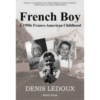
Excerpt from My Memoir French Boy: I come into the world.
DL: “I Come Into the World” is an excerpt from my memoir French Boy / A 1950s Franco-American Childhood. The use of Canadien, the French version of Canadian, in this text as everywhere in the memoir is to distinguish an English-speaking Canadian from a French-speaking one without resorting to the term French Canadian. [When was […]

This is how to market a memoir!
You’ve written your memoir, or are perhaps still writing. The art and craft of writing a memoir are foremost in the creation stage but there will come another stage afterwards that is to commit to market a memoir you have written.
I will share a process of reaching as large an audience as possible for the book you have worked so hard on. It’s not too early to be thinking of marketing.
I will mentor you on this very subject by sharing my process for my most recent memoir French Boy /A 1950s Franco-American Childhood. Since this is an independently published book, it is my responsibility to identify and then reach out to my potential audience. This is the audience that in some way can be said to have been waiting for my memoir—or your memoir.
Where is my audience—and yours, of course—to be found? What do they read, where do they post, where do they congregate?
[Free Membership required to read more. See below. ]
We'd love to have you access this content. It's in our members-only area, but you're in luck: becoming a member is easy and it's free.
Already a Member?
Not a Member Yet?

Vivid Characters Are Essential in a Memoir
Why Creating Vivid Characters is Essential
The people in your story are your characters. It is your task as memoir writer to bring vivid characters to the attention of your readers. You must use descriptive writing to present believable characters. Without other people, our lives and memoirs risk becoming dull. Although ideas are pivotal for many individuals, relationships are even more commanding. We are intrigued with who other people are and how they function. “Who’s that? What are they doing? Where did they come from?” These are the questions we want answered. To write a strong story, capitalize on this interest.
[Free Membership required to read more. See below. ]
We'd love to have you access this content. It's in our members-only area, but you're in luck: becoming a member is easy and it's free.
Already a Member?
Not a Member Yet?

Show Don’t Tell Your Characters, or Don’t Describe Your Characters–Show Them!
The old adage “Show, don’t tell your characters!” is as true as ever. It is one technique that will always improve your writing. I admit that there is some great writing that makes a precedent for “tell,” but as a rule, “show” is more effective.
1. Your computer and its keyboards are your movie camera. Show Don’t Tell Your Characters.
In a film, a director ( that’s you!) doesn’t have an actor go on screen to tell the audience that someone is angry. Instead, he shows the character in a scene where anger is in action. [Free Membership required to read more. See below. ]
We'd love to have you access this content. It's in our members-only area, but you're in luck: becoming a member is easy and it's free.
Already a Member?
Not a Member Yet?

Interview with Dana Tramba / Making Peace With The Pieces of My Life
Denis Ledoux: Can you tell our readers what your book, Making Peace with the Pieces of My Life, is about and why you were compelled to write your book? What was driving you to spend the time, energy, and money to get this book out into the world? Dana: I wanted to reach the divorced […]

Difficult, Painful Memories Can Make a Memoir More Psychologically Astute.
We all arrive at adulthood with some difficult painful memories. In this post, I offer you procedures for dealing with and healing those memories.
First of all, writing about painful memories should not be an occasion to re-traumatize yourself. Stop for the moment if you feel overcome, but if you feel ready to write about a painful time, begin by writing all the details of the memory. Details need not be significant. If there was a cup of coffee on the table, mention it. You will find that little details help bring your memory back.
Yes, difficult, painful memories are disturbing.
[Free Membership required to read more. See below. ]
We'd love to have you access this content. It's in our members-only area, but you're in luck: becoming a member is easy and it's free.
Already a Member?
Not a Member Yet?

French Boy Hits #1 in Best Seller ‘New England Memoirs’ List
The category best seller status on Amazon is fleeting but there was at least one moment in the past weekend when French Boy was #1 in “New England Memoirs.” That feels good—in fact, very good! I want to thank everyone who has bought a copy. To others, I ask you to please help to keep […]

8 Tips: How to Have a Successful Memoir Interview
A successful memoir interview will add depth to your memoir.
While you know much about your story, it is always beneficial to gather information from other sources to fill in the gaps. These sources can be formal research on the net or in a library or it can be reviewing letters and journals or talking with people who know parts of your story.
Here is some guidance on an important step that will ground your memoir. This step involves interviewing people.
In this post, I offer eight tips for making a successful memoir interview as part of your research.
1) For a successful memoir interview, plan enough time to be with your subject.
[Free Membership required to read more. See below. ]
We'd love to have you access this content. It's in our members-only area, but you're in luck: becoming a member is easy and it's free.
Already a Member?
Not a Member Yet?

Interview with Denis Ledoux French Boy / A 1950s Franco-American Childhood
[Free Membership required to read more. See below. ]
